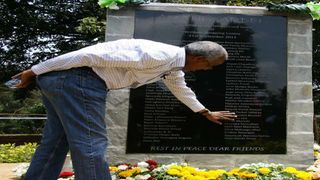
Former Kenya Red Cross boss Abbas Gullet next to a plaque bearing the names of those who died in the Westgate attack. The siege ended after four days.
| File | Nation Media GroupNews
Premium
How the terrorists left Eastleigh for Westgate
What you need to know:
- All the terrorists had discarded their cell phone numbers two days before the attack.
- The sim card holders for these two numbers were found in an abandoned car.
A call to Egypt was the first indicator on the nature of the identity of the Westgate mall attackers. The caller – Somali-Norwegian Hassan Mohammed Dhuhulow – was reaching his uncle Abdi Mohammed Dhuhulow.
By then, global media were breaking news of the bloodbath.
“Watch BBC and Al Jazeera. I am responsible for that. Say bye to the family,” he reportedly told his uncle.
During the early hours of the attack, Dhuhulow had been shot in the leg by Constable Ali Miraji, who told Chief Magistrate Francis Andayi that he had mistaken the terrorists for General Service Unit (GSU) officers.
When the attackers started shooting at him, the police officer returned fire.
CCTV images from inside the mall during the siege later showed a limping Dhuhulow wearing a black shirt and a blood-soaked bandage below his left knee.
All the terrorists had discarded their cell phone numbers two days before the attack.
Two of the numbers, the court was told, were activated inside Al-Habib Shopping Centre at 12.30pm and 12.47pm.
On the morning of the attack, they were geo-located moving from Eastleigh’s Sixth Street, reaching Westgate at 1.47pm.
Abandoned car
The sim card holders for these two numbers were found in an abandoned car.
At 3.53am, a man identified as Abdulahi Ali – and thought to be the operation’s commander – woke the attackers up from his hideout at Solar Lodge, Eastleigh. His number had been activated in Eastleigh on September 17, 2013.
Shortly after that call, Abdulahi Ali boarded a bus for Wajir at 4.43am to start his flight from Nairobi.
He was the man the terrorists were speaking to during the siege. He switched off his phone at Wajir Baraza Park at 5.02pm. Ali has never been found.
The attackers then assembled in Eastleigh, drove through Pangani and entered the mall using Mwanzi Road.
Mr Mwiti Kiteme, a vegetable supplier, was driving out when he was shot at by people in an oncoming car. He fled on foot.
Initially, his vehicle was thought to be the one that dropped the attackers, he told the court.
The initial response was by police officers, who thought it was a bank robbery, then the Recce Squad from the GSU, then the Rapid Response Unit and later a special squad from the Kenya Defence Forces (KDF).
After a fierce exchange of fire between KDF soldiers and the attackers, the parking lot of the building around Nakumatt supermarket collapsed into a ball of fire that engulfed the attackers.
Mohammed Said Abdinur and Ahmed Hassan Abukar were easily identified: They had black head scarves. Abukar was confronted by a boy who told him: “You are a bad man”.
Surprisingly, he allowed the boy, his mother and sister to leave. He also gave them some Mars bars.
On the rooftop, where a cooking competition was disrupted, some of those in attendance were not as lucky.
After a round of shooting, Abukar said: “If there’s (sic) any children alive here, we’ll let them go. We won’t hurt them,” a survivor quoted him as saying.
A woman pulled out her two children. The child who had been injured by a shrapnel was loaded on a shopping cart.
“We are not monsters,” the woman recalled Abukar saying.
Islamic creed
“We just want people to understand that they can’t come to our homes and kill us. We will do the same to them.”
Abukar also ordered Muslims to leave.
“I can see you have women and children,” he said.
“Yes! We have children,” a local radio DJ would recall answering, hoping everybody would be safe.
However, Abukar and Abdinur stepped back and began shooting.
At first, those who could recite the Shahada, the Islamic creed, were asked to raise their hands and leave. Those who raised their hands and could not recite the creed were killed. The siege would last four days.
Following the raid, the government set up the DCI Emergency Response Team, which is supposed to handle terror-related tasks and carry out investigations.
By admitting circumstantial evidence to jail the accomplices, Mr Andayi said giving support to terrorists includes communication with them.





